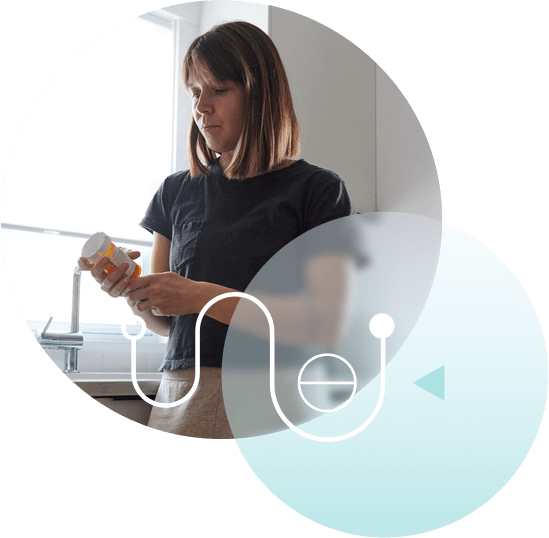PRESCRIPTION MEDICATION
Duloxetine
type of medication:
Duloxetine is a commonly prescribed antidepressant medication (SNRI) that’s often well-tolerated and effective.
Treatment for:
Major depressive disorder, generalized anxiety disorder

PRESCRIPTION MEDICATION
type of medication:
Duloxetine is a commonly prescribed antidepressant medication (SNRI) that’s often well-tolerated and effective.
Treatment for:
Major depressive disorder, generalized anxiety disorder

We offer affordable care for everyone and accept most major insurance, including Medicare and Medicaid.
Learn more






duloxetine


Mimi Winsberg, MD
Chief Medical Officer, Brightside Health
Stanford-trained psychiatrist with 25 years of practice
At Brightside Health, our psychiatric providers specialize in finding the right medication for your specific needs. As part of your treatment, your provider may recommend duloxetine. They’ll go over how the medication works, and answer any questions you may have.
In the meantime, we’ve provided some general information about this medication below. If you have any further questions, please feel free to contact us at [email protected].
Duloxetine, commonly sold under the brand name cymbalta, is a type of antidepressant called a serotonin-norepinephrine reuptake inhibitor. This prescription medication can boost levels of serotonin and norepinephrine—neurotransmitters, or chemical messengers, in your brain that affect your mood.
Serotonin creates feelings of well-being, and norepinephrine promotes alertness and energy. Duloxetine works by maintaining healthy levels of them in your brain, making you feel better and improving symptoms of depression.
Duloxetine can be prescribed as an antidepressant or for pain, such as diabetic nerve pain, fibromyalgia, and other types of chronic pain.
At Brightside, we use duloxetine to treat:
It’s approved to treat major depressive disorder in adults and generalized anxiety disorder in adults and children age 7 and older.
At Brightside, our psychiatric providers specialize in personalizing treatment for each person. We give you personal attention and expert advice you can count on—we explain all your options and use our expertise to find the medication that’s right for you. We make sure you understand how medications work and what to expect so that your treatment is worry-free.
Duloxetine treats a variety of symptoms related to mood and emotional well-being, including:
At Brightside, you and your provider will discuss all your symptoms so that we can tailor treatment to your unique needs. Some medications work better for particular symptoms, and we help you make sense of all your options. We specialize in finding the right fit for each person.
We understand you want to feel better right away, and you want to make sure a particular medication will work. Your age, sex, genetic makeup, family history, symptoms, and other medications you’re taking may affect how well any antidepressant works for you.
At Brightside, we’re experts at finding a medication that helps you feel like yourself again. We use our advanced Brightfinder technology to learn about you and discover which medications and treatment approaches will work best for you, drawing from a wealth of research on antidepressants and other treatment approaches. We combine leading-edge technology and our providers’ experience to develop a treatment tailored to your exact needs.
Together, you and your provider will develop a plan to improve how you feel as quickly as possible. Keep in mind that it won’t happen overnight. Be patient, and know that your provider may need to adjust your dosage to ensure you get optimal results with the fewest side effects. Your Brightside provider will make sure you’re well-informed and supported every step of your treatment journey.
It’s natural to wonder how long you’ll need to continue taking the medication. Do not stop taking it once you feel better. Feeling like yourself again means the medication is working. It’s important to follow your provider’s recommendations to ensure you continue to feel better. You and your provider will decide together how long you should take duloxetine. Please don’t stop taking it or make changes without talking to your provider first.
How long you need to take duloxetine will depend on your symptoms and diagnosis. Some people may only need to take it short-term, while others need to take it for an extended period.
Treatment may take a little longer if your provider needs to change your dosage, add other medications, or make other changes to give you the best results.
Studies have shown that antidepressants relieve symptoms of depression about 40-60% of the time and additional treatments (such as therapy and lifestyle improvements) on top of medication often lead to the best outcomes.
To get the best results with medication, it’s important to consistently measure progress during treatment. This is known as Measurement Based Care, and it’s the approach we use at Brightside. It’s common to adjust the dose and/or medication when starting antidepressants until you find just the right fit.
How well duloxetine works for you may depend on the severity of your depression or anxiety. Well-controlled clinical trials have proven it effective in treating adults with major depressive disorder and preventing relapse.
The medication is shown to be effective in treating generalized anxiety disorder in adult clinical trials and one pediatric clinical trial.
Duloxetine takes about two to four weeks before it begins to make you feel better. It’s essential to keep taking it, even if you don’t notice a difference right away. If you have concerns, talk to your Brightside provider—we’re happy to answer your questions. Your provider will keep a close eye on your progress and adjust your medication dosage as needed to help you feel your best.
Some people are concerned that taking an antidepressant will change who they are. They don’t. They focus on helping you feel better. When you take duloxetine, you’ll still feel like yourself—your very best self.
Duloxetine is a relatively safe medication when properly prescribed and taken as directed. But, like all medications, it may have side effects. Each person reacts differently to prescribed drugs. At Brightside, we keep a close eye on you to make sure you’re getting the best results with minimal side effects.
It’s not uncommon to have side effects with duloxetine, which often are only temporary and manageable. But it’s critical to review the FDA warnings before starting this medication, such as not taking it within two weeks of taking other antidepressants called monoamine oxidase inhibitors.
Some of the most common side effects include:
Long-term side effects may include liver damage—especially if you drink heavily—changes in blood pressure, and an increased risk of falling, particularly if you’re older.
At Brightside, your health and safety are our highest priorities. We make sure you get individual attention and guidance to manage any side effects and make sure you feel your best.
If you’re feeling better and considering stopping duloxetine, talk to your doctor first. While antidepressants are not physiologically or psychologically addictive, they can cause discontinuation syndrome if stopped abruptly.
Discontinuation syndrome is a consequence of abruptly stopping certain types of antidepressants––particularly selective serotonin reuptake inhibitors (SSRIs) and serotonin-norepinephrine reuptake inhibitors (SNRIs).
It can include a range of symptoms that may occur in patients who suddenly stop their SSRIs or SNRIs. These are the most common symptoms of discontinuation syndrome:
If you’re feeling better and considering stopping duloxetine, talk to your provider first. Your Brightside provider will help guide you to reduce the dose gradually to avoid withdrawal symptoms so that you can continue to receive optimal benefits.
If you’re pregnant or plan to become pregnant, please talk to your health care provider before making any medication changes.
The American College of Obstetricians/Gynecologists (ACOG) recommends that therapy with SNRIs during pregnancy be individualized, with clinical input from a mental health clinician, obstetrician, primary care provider, and pediatrician. Women should avoid taking SNRIs unless the benefits of taking them outweigh the risks to mother and baby.1 Talk to your doctor about the best option for you.
Brightside providers recommend medications other than duloxetine for pregnant women seeking treatment for major depressive disorder or generalized anxiety disorder for the first time because the medications cross the placenta. Some newborns exposed to SNRIs like duloxetine have experienced respiratory distress, seizures, temperature instability, feeding difficulty, vomiting, hypoglycemia, irritability, constant crying, and tremor immediately following delivery.
If you’re taking duloxetine, small amounts of this medication may be present in your breast milk. If you’re breastfeeding and plan to begin taking an antidepressant for the first time, your doctor may recommend switching your medication. If you took duloxetine during pregnancy without problems, you can continue to take it while breastfeeding as long as there are no other reasons you should stop.
We’ll discuss all your options to ensure you have the information you need to make an informed decision. We’re here to answer your questions and help you decide what’s right for you.
Duloxetine isn’t addictive, but it can cause withdrawal symptoms if stopped suddenly.
If you have concerns about taking duloxetine or want to change your dosage, please talk to your Brightside providers first. They can help you make adjustments safely.
You can view the FDA black box warning for duloxetine here. If you have questions about whether the black box warning for duloxetine applies to you, please talk to your doctor.
GETTING STARTED WITH BRIGHTSIDE
Start your journey towards life-changing care in a matter of minutes. You’ll receive compassionate support and expert advice the entire way.
Complete a quick questionnaire, then connect 1:1 with your dedicated provider to discuss your needs.
Your provider will pinpoint the most effective medication for you and send it to your pharmacy of choice.
Weekly check-ins help you keep track of symptoms, giving your provider data to make adjustments.
Watch your scores and well-being improve along the way with our Proactive Progress Tracking tool.
OUR PSYCHIATRY plans
Because quality mental health care shouldn’t be out of reach for anyone.
PERSONALIZED
Pay with insurance
or $95/month
comprehensive
Pay with insurance
or $349/month
We accept insurance.






“I feel MUCH IMPROVED! My medication works well for me, and the personal care I have received has been wonderful! My provider listens to me with understanding and compassion.”
Tonya T


“5/5. My provider is excellent and takes time to understand my symptoms and make informed medication determinations. After many years of being on multiple medications, I am feeling much relief after less than two months of treatment.”
Anonymous


“Happier than I have been in years. One of the best decisions of my life was trying Brightside.”
Michael P


“I was impressed with how fast I was able to get an appointment as the wait in my area is months long. I received helpful medication quickly, which is also hard to get here. My provider is terrific, helpful, and kind. The zoom appointments are great for my hectic life. Really love this program so far!”
Anna W


“Very easy and simple to get the medication I needed. Since starting to use Brightside, I have begun to feel so much better about myself and I wake up every day with a sense of excitement that wasn’t there before!”
Brandon D


“It is so convenient to get medication and a therapist that work with my schedule. The quality of care is beyond top notch, and being able to see someone on Sundays is so convenient for people who work during the week.”
Anonymous


“I feel MUCH IMPROVED! My medication works well for me, and the personal care I have received has been wonderful! My provider listens to me with understanding and compassion.”
Tonya T


“5/5. My provider is excellent and takes time to understand my symptoms and make informed medication determinations. After many years of being on multiple medications, I am feeling much relief after less than two months of treatment.”
Anonymous


“Happier than I have been in years. One of the best decisions of my life was trying Brightside.”
Michael P


“I was impressed with how fast I was able to get an appointment as the wait in my area is months long. I received helpful medication quickly, which is also hard to get here. My provider is terrific, helpful, and kind. The zoom appointments are great for my hectic life. Really love this program so far!”
Anna W


“Very easy and simple to get the medication I needed. Since starting to use Brightside, I have begun to feel so much better about myself and I wake up every day with a sense of excitement that wasn’t there before!”
Brandon D


“It is so convenient to get medication and a therapist that work with my schedule. The quality of care is beyond top notch, and being able to see someone on Sundays is so convenient for people who work during the week.”
Anonymous
